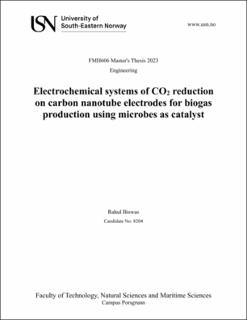Electrochemical systems of CO2 reduction on carbon nanotube electrodes for biogas production using microbes as catalyst
Master thesis

Permanent lenke
https://hdl.handle.net/11250/3122741Utgivelsesdato
2024Metadata
Vis full innførselSamlinger
Sammendrag
This study explores electrochemical systems as an innovative approach for CO2 utilization in biomethane production using the carbon-metal composite electrode material and microbes as catalyst. The emphasis has been given on developing biogas upgrading technologies, in response to the increasing demand for sustainable energy solutions. This thesis aims to investigate the electroreduction of CO2 conversion into CH4 on carbon nanotube-coated aluminium electrodes (Al/CNTs) with the assessment of current generation and methane production efficiency. The chronoamperometry method was applied to investigate the electrochemical reactions using methanogen mix-culture. The constant potential of -1.3 V vs. Ag/AgCl and gas composition was determined through gas chromatography (GC) analysis. The methodology also involved monitoring pH, alkalinity, volatile fatty acids (VFAs), and chemical oxygen demand (COD) variations over time. Also, scanning electron microscopy (SEM) imaging was employed to analyze the morphology of the electrodes. The Ex 2-Batch 3 experiment revealed a significant increase in biogas production achieving 3.66 mL/(cm2 Al/CNTs surface area) over 20 days. At a current density of -0.488 mA/cm2, the obtained CO2 conversion efficiency, Faradic efficiency, and energy efficiency were 18.53%, 18.39%, and 3.12%, respectively. Finally, this research advances the concept of CO2 reduction with Al/CNTs electrodes; however, challenges with electrode design, operation variables optimization, and insufficient long-term stability evaluations suggest areas that require further investigation and improvement in electrochemical CO2 conversion for sustainable biogas upgrading.